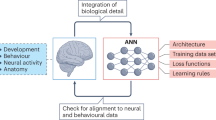Abstract
We discuss the justification of Bickle's “ruthless” reductionism. Bickle intends to show that we know enough about neurons to draw conclusions about the “whole” brain and about the mind. However, his reductionism does not take into account the complexity of the nervous system and the fact that new properties emerge at each significant level of integration from the coupled functioning of elementary components. From a methodological point of view, we argue that neuronal and cognitive models have to exert a mutual constraint(MC) on each other. This approach would refuse to award any priority of cognitive approaches over neuroscience, and reciprocally, to refuse any priority of neuroscience over cognitive approaches. MC thus argues against radicalreductionism at the methodological level.
Similar content being viewed by others
References
Bickle, J. 2003. Philosophy and Neuroscience: A Ruthlessly Reductive Account. Dordrecht: Kluwer Academic Publishers.
Churchland, P. S. 1995. Can neurobiology teach us anything about consciousness? Unpublished paper based on her Presidential Address to the American Philosophical Association, Pacific Division, March, 1993, published in Proceedings and Addresses of the APA (1994). http://www.ecs.soton.ac.uk/~harnad/Papers/Py104/church.neuro.html.
Georgopoulos, A. P., Schwartz, A. B. and Kettner, R. E. 1986. Neuronal population coding of movement direction. Science 233(4771): 1416–1419.
Grammont, F. and Riehle, A. 2003. Spike synchronization and firing rate in a population of motor cortical neurons in relation to movement direction and reaction time. Biol. Cybern. 88(5): 360–373.
Hooker, C. A. 1981. Towards a general theory of reduction. Dialogue 20: 38–59, 201–236, 496–529.
Reichenbach, H. 1957. The Rise of Scientific Philosophy. Berkeley, CA.: University of California Press.
Requin, J. 1987. Les neurosciences cognitives: Au-delà du réductionnisme, une science de synthèse? In: M. Siguan (ed.), Comportement, Cognition, Conscience (31–57). Paris: PUF.
Roll, J. P. and Roll, R. 1993. Le sentiment d'incarnation: arguments neurobiologiques. Rev. Méd. Psychosom. 35: 75–90.
Van Gulick, R. 1995. What would count as explaining consciousness? In: T. Metzinger (ed.), Conscious Experience (pp. 61–79). Exeter: Imprint Academic.
Author information
Authors and Affiliations
Corresponding author
Rights and permissions
About this article
Cite this article
Legrand, D., Grammont, F. A matter of facts. Phenom Cogn Sci 4, 249–257 (2005). https://doi.org/10.1007/s11097-005-4072-4
Issue Date:
DOI: https://doi.org/10.1007/s11097-005-4072-4



